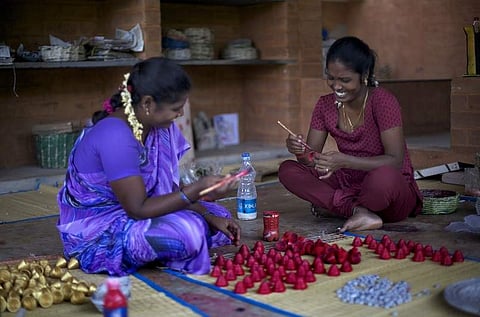
- LIFESTYLE
- FASHION
- FOOD
- ENTERTAINMENT
- EVENTS
- CULTURE
- VIDEOS
- WEB STORIES
- GALLERIES
- GADGETS
- CAR & BIKE
- SOCIETY
- TRAVEL
- NORTH EAST
- INDULGE CONNECT

Sixteen years ago, Chitra Govindan and her family were among those who lost everything on the fateful day on December 26, when the Indian Ocean tsunami hit coastal South India. Those who lived through the natural disaster may still have graphic memories of the devastation fresh in their minds, but most of them particularly women around Auroville near Pondicherry, including Chitra have rebuilt their lives and turned entrepreneurs, courtesy Wellpaper Auroville.
An organization started with the aim of helping and empowering women, Wellpaper was founded by Danny Merguei. A chartered accountant by profession, Danny came to India with his wife and three children just a few months prior to the tsunami. He quit his plush job in New York, where he was working at one of the big four accounting firms. He came to India to try the community life in Auroville. “It’s an idea of sharing versus ownership. Diverse communities living together and helping each other by sharing whatever they have,” explains Danny.
The plan was to live in India for a year and see how things could work out, but then the natural disaster occurred, and Danny got a goal to achieve – to help the communities of women rebuild their lives from scratch. That’s when Wellpaper was founded, sometime in early 2005. “First came the idea of upcycling things and we learnt from local artisans who knew the art of papier-mâché. Then we learnt to upcycle many other things such as newspapers, coconut shells and bamboo. It was a collaborative effort. We started by training about 15 women, but then a few of them left the programme, but since we started about 150 women from surrounding villages have been trained,” says Danny.
Chitra was one of the first women to join Wellpaper and has stayed with them since then. She is adept in creating products such as baskets, bowls, hair and home accessories from recycled newspapers. Just like her, there are other women from Kottakarai, a nearby village who have been trained in not only the craft but also in training other self-help groups of women in different towns and villages. “After joining Wellpaper a lot of things changed for me. Along with learning the craft, I learnt how to run a business and also to speak in English. I learnt to be independent in life,” says Chitra who trains other artisans in cities such as Pune, Hyderabad and Bengaluru. With her new identity, Chitra has been able to support herself and her family. Both her daughter and son are pursuing their higher studies in colleges. But the future looks grim for Chitra and many others like her.
Before the pandemic hit, they were getting orders from across the world. However, the last one year has been really tough for Wellpaper and its women artisans. “We were primarily selling at FabIndia and at outlets in airports. But orders stopped because of the pandemic and the lockdown. We are trying to sell through online marketing, but the cost of shipping is very high compared to the price of the products, so it’s getting very challenging to be able to sustain,” reveals Danny.
Although the organization is quite active on YouTube, uploading videos of their products and artisans, it hasn’t really translated to orders. “We really enjoy what we do, but we are dying slowly,” concludes Danny.